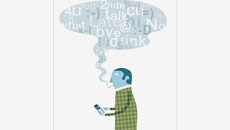In what could open a new chapter in the development of drugs for treating Alzheimer's disease, for which currently there is no cure, researchers have discovered a new therapeutic target for tackling memory impairment.
Reactive astrocytes (the most abundant cell type of the human brain), which have been commonly observed in Alzheimer's patients, aberrantly and abundantly produce the chief inhibitory neurotransmitter gamma-Aminobutyric acid (GABA) and release it through the Bestrophin-1 channel to suppress normal information flow.
The released GABA strongly inhibits neighbouring neurons to cause impairment in synaptic transmission, plasticity and memory, the findings showed.
GABA plays a role in regulating neuronal excitability throughout the nervous system.
"From this study, we reveal the novel mechanism of how Alzheimer's patients might lose their memory," said C. Justin Lee from Korea Institute of Science and Technology (KIST), South Korea.
"We also propose new therapeutic targets, which include GABA production and release mechanisms in reactive astrocytes for treatment of Alzheimer's disease," Lee added.
The researchers discovered that reactive astrocytes in the brains of Alzheimer's disease model mice produce the inhibitory transmitter GABA by the enzyme Monoamine oxidase B(MAO-B) and release GABA through the Bestrophin-1 channel to suppress normal information flow during synaptic transmission.
Based on this discovery, the team was able to reduce the production and release of GABA by inhibiting MAO-B or Bestrophin-1, and successfully ameliorate impairments in neuronal firing, synaptic transmission and memory in Alzheimer's disease model mice.
The team demonstrated that treating these mice with modelled Alzheimer's disease with a MAO-B inhibitor fully recovered the mice's memory.
The findings appeared in the journal Nature Medicine.





